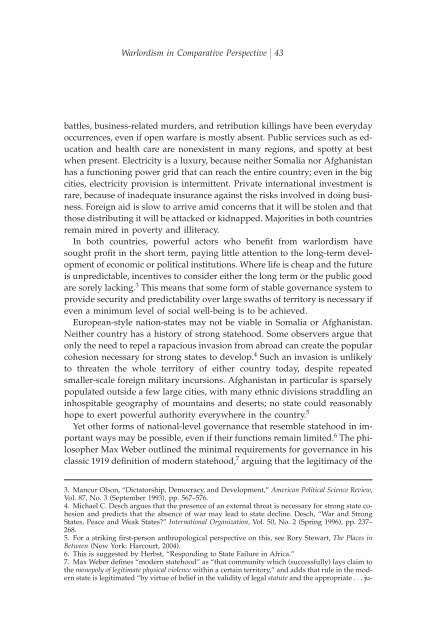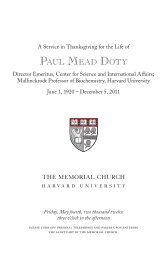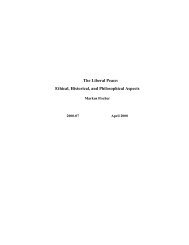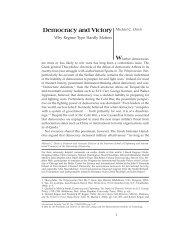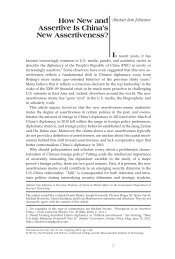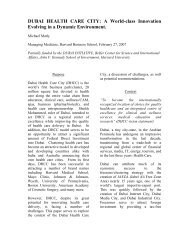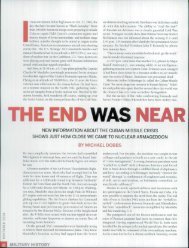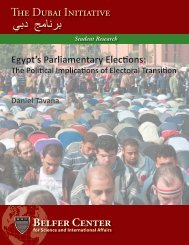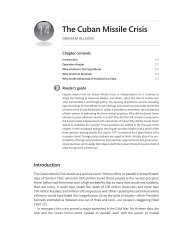Warlordism in Comparative Perspective - MIT Press Journals
Warlordism in Comparative Perspective - MIT Press Journals
Warlordism in Comparative Perspective - MIT Press Journals
Create successful ePaper yourself
Turn your PDF publications into a flip-book with our unique Google optimized e-Paper software.
<strong>Warlordism</strong> <strong>in</strong> <strong>Comparative</strong> <strong>Perspective</strong> 43<br />
battles, bus<strong>in</strong>ess-related murders, and retribution kill<strong>in</strong>gs have been everyday<br />
occurrences, even if open warfare is mostly absent. Public services such as education<br />
and health care are nonexistent <strong>in</strong> many regions, and spotty at best<br />
when present. Electricity is a luxury, because neither Somalia nor Afghanistan<br />
has a function<strong>in</strong>g power grid that can reach the entire country; even <strong>in</strong> the big<br />
cities, electricity provision is <strong>in</strong>termittent. Private <strong>in</strong>ternational <strong>in</strong>vestment is<br />
rare, because of <strong>in</strong>adequate <strong>in</strong>surance aga<strong>in</strong>st the risks <strong>in</strong>volved <strong>in</strong> do<strong>in</strong>g bus<strong>in</strong>ess.<br />
Foreign aid is slow to arrive amid concerns that it will be stolen and that<br />
those distribut<strong>in</strong>g it will be attacked or kidnapped. Majorities <strong>in</strong> both countries<br />
rema<strong>in</strong> mired <strong>in</strong> poverty and illiteracy.<br />
In both countries, powerful actors who beneªt from warlordism have<br />
sought proªt <strong>in</strong> the short term, pay<strong>in</strong>g little attention to the long-term development<br />
of economic or political <strong>in</strong>stitutions. Where life is cheap and the future<br />
is unpredictable, <strong>in</strong>centives to consider either the long term or the public good<br />
are sorely lack<strong>in</strong>g. 3 This means that some form of stable governance system to<br />
provide security and predictability over large swaths of territory is necessary if<br />
even a m<strong>in</strong>imum level of social well-be<strong>in</strong>g is to be achieved.<br />
European-style nation-states may not be viable <strong>in</strong> Somalia or Afghanistan.<br />
Neither country has a history of strong statehood. Some observers argue that<br />
only the need to repel a rapacious <strong>in</strong>vasion from abroad can create the popular<br />
cohesion necessary for strong states to develop. 4 Such an <strong>in</strong>vasion is unlikely<br />
to threaten the whole territory of either country today, despite repeated<br />
smaller-scale foreign military <strong>in</strong>cursions. Afghanistan <strong>in</strong> particular is sparsely<br />
populated outside a few large cities, with many ethnic divisions straddl<strong>in</strong>g an<br />
<strong>in</strong>hospitable geography of mounta<strong>in</strong>s and deserts; no state could reasonably<br />
hope to exert powerful authority everywhere <strong>in</strong> the country. 5<br />
Yet other forms of national-level governance that resemble statehood <strong>in</strong> important<br />
ways may be possible, even if their functions rema<strong>in</strong> limited. 6 The philosopher<br />
Max Weber outl<strong>in</strong>ed the m<strong>in</strong>imal requirements for governance <strong>in</strong> his<br />
classic 1919 deªnition of modern statehood, 7 argu<strong>in</strong>g that the legitimacy of the<br />
3. Mancur Olson, “Dictatorship, Democracy, and Development,” American Political Science Review,<br />
Vol. 87, No. 3 (September 1993), pp. 567–576.<br />
4. Michael C. Desch argues that the presence of an external threat is necessary for strong state cohesion<br />
and predicts that the absence of war may lead to state decl<strong>in</strong>e. Desch, “War and Strong<br />
States, Peace and Weak States?” International Organization, Vol. 50, No. 2 (Spr<strong>in</strong>g 1996), pp. 237–<br />
268.<br />
5. For a strik<strong>in</strong>g ªrst-person anthropological perspective on this, see Rory Stewart, The Places <strong>in</strong><br />
Between (New York: Harcourt, 2004).<br />
6. This is suggested by Herbst, “Respond<strong>in</strong>g to State Failure <strong>in</strong> Africa.”<br />
7. Max Weber deªnes “modern statehood” as “that community which (successfully) lays claim to<br />
the monopoly of legitimate physical violence with<strong>in</strong> a certa<strong>in</strong> territory,” and adds that rule <strong>in</strong> the modern<br />
state is legitimated “by virtue of belief <strong>in</strong> the validity of legal statute and the appropriate ...ju-


